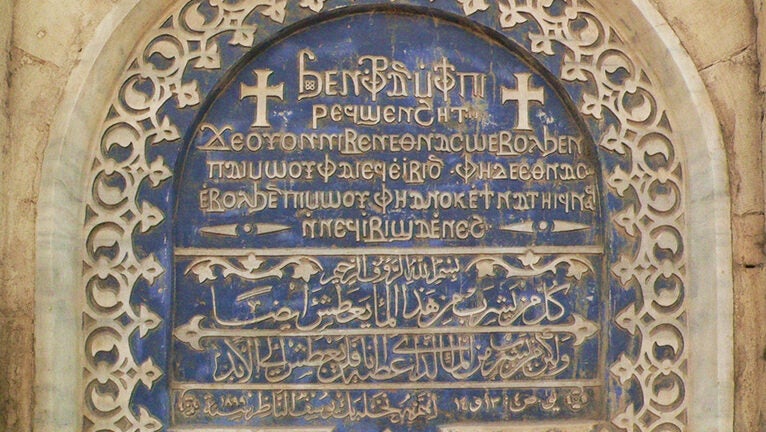Zeldes' Team Awarded NEH Grant for Coptic Linguistics Project
November 19, 2018 — Thanks to ongoing work by a Georgetown College linguistics professor, more and more texts written in ancient Coptic are available for translation and analysis to anyone with a laptop and an internet connection.
Professor Amir Zeldes of the Department of Linguistics has received a grant of more than $320,000 from the National Endowment for the Humanities to expand the study of Coptic texts using computational linguistics over the next three years.
The grant is the fifth in a series awarded to Zeldes and co-investigator Prof. Carrie Schroeder of the University of the Pacific for their work on the Coptic Scriptorium project, a web-based database and analysis tool for ancient Coptic texts.
A TEACHER-DRIVEN PATH
Zeldes began studying Coptic, the first alphabetized language to arise in ancient Egypt, while in college at the Hebrew University of Jerusalem. He came across it in much the same way that many students today come across new disciplines.
“I asked other students which elective to take, and they said ‘The one with the best teacher,’” Zeldes said. “I ended up studying Coptic and Ancient Egyptian for the following two years and loved every minute of it.”
He returned to the ancient language years later, when a chance meeting with Schroeder at an NEH-sponsored summer institute program spurred a new collaborative project.
“We realized pretty quickly we could team up and try to bring Coptic online closer to the level that Greek and Latin already enjoy thanks to projects such as the Perseus Digital Library,” Zeldes said. “The result is our site, Coptic Scriptorium.”
BRINGING COPTIC ONLINE
Coptic Scriptorium is a web-based project allowing users to access, translate, analyze, and annotate ancient Coptic texts. Its ability to conduct morphological and syntactic analysis is particularly crucial, as Coptic’s complex word formation and fusion processes make search and analysis challenging.
“It’s been used to study the language and style of early monastic leaders in 4th-5th century Egypt, compare versions of the Bible, do network analysis on names of people and places mentioned in the same texts, study the distribution of Greek loanwords in different Coptic genres, and discover textual reuse in the Coptic transmission history, such as exact and fuzzy citations of Biblical passages in Coptic writers’ original texts,” Zeldes said.
The NEH is one of several organizations that have provided funding for the project. The latest grant will expand Coptic Scriptorium’s database to include a broader range of texts — a task that comes with its own set of challenges.
“We want to expand our inventory of corpora, but this means dealing with more heterogeneous data — from ‘messy’ standards in digitized out-of-copyright editions, to working with data from Optical Character Recognition,” Zeldes said. “We’re trying to adapt machine learning tools to be more error tolerant, and to develop workflows that can produce consistent results despite varying types of input.”
VIVID TRANSLATIONS
The Coptic Scriptorium project has brought students into the research fold for years, and Zeldes foresees even more opportunities for students following the most recent NEH grant.
“Many students have worked on the projects in the past, and that will continue,” Zeldes said. “Just last week, I presented a paper with my student Mitchell Abrams at a conference in Belgium on the Coptic Universal Dependency Treebank, which allows researchers to examine Coptic syntax in the same format used to encode syntax analyses in over 70 languages.”
Zeldes sees Coptic as a fascinating linguistic research subject for students to dive into, both for its place in the history of language and for the vivid content of translations.
“It’s the last stage of Ancient Egyptian, the language of the hieroglyphs, which makes it part of the longest continuously attested human language on Earth,” Zeldes said. “It really tells you about life in the early first millennium in Egypt, at a time when Christianity was starting out. … I’m always blown away when I can read what people were saying and thinking over 1500 years ago.”
